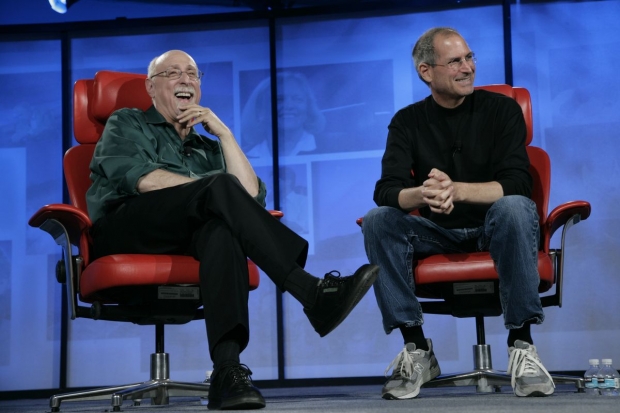Mossberg has announced that he will be retiring in June, after a busy life in credible journalism before giving up and hawking Apple gear in the Wall Street Journal. What made Mossberg’s transition even more surprising was that he is an old-school hack and started work in 1970 in the days when it was a rewarding job and being a journalist actually meant something.
“Over my career, I’ve reinvented myself numerous times. I covered the Pentagon, the State Department, and the CIA. I wrote about labour wars, trade wars, and real wars. I chronicled a nuclear plant meltdown and the defeat of communism. I co-founded a couple of media businesses”, Mossberg said.
That all changed in 1991 when he started work as a tech columnist for the Wall Street Journal. It was a move that should have made the technology companies quake with fear. The industry press was mostly populated by techies who were not trained as journalists who got the job because they knew which way to plug in a mouse. There were lots of stories in the industry which were not being written because people lacked the skills to find them out. Mossberg did well winning all sorts of awards for his writing.
It changed again in 1997 when Steve Jobs returned to Apple and Mossberg found that he could not write a negative story about the company. In fact he rapidly became Steve Jobs’ favourite “journalist” getting gear early on the assumption that he would praise it to the skies. No matter what Apple did, Mossberg, along with the New York Times, assisted in getting its message out there often using buzzwords which were part of the Apple marketing hymn sheet.
For example in his iPhone 4 review Mossberg noted that the iPhone 4 was dropping calls but blamed AT&T when it was clearly a design flaw. Steve Jobs insisted that users were holding the phone wrong and issued a rubber band to fix the problem.
On Jobs’ death he wrote glowingly of Jobs, comparing the marketing huckster to Henry Ford and Thomas Edison and got quite narked when Hollywood started producing films which were closer to the truth.
Reading his “reviews” he claimed that these films were not the Steve Jobs he knew and failed to depict him in a positive light. We guess that he saw showing Jobs in his best light was his job. Mossberg was there in the late nineties well away from the Jobs who was such an arsehole he was fired by Apple and ignored the fact he fathered a child with his co-worker. Steve Wozniak, who was there at the time, said it was exactly the Jobs he knew and personally I would trust Woz. Mossberg also seemed to ignore the Jobs who drove his car without licence plates and parked in Apple's disabled car parks.
Soon after Jobs’ death Mossberg started to get more pragmatic about his pro-Apple coverage and more balanced stories about the Fruity Cargo cult started to appear.
“The short answer is that the company has surged financially to heights Jobs likely never dreamed of. It has also refined its popular product line and retained most of its senior talent. But Cook’s Apple has yet to produce the kind of new, game-changing product Jobs was famous for launching.”
Of course, if Mossberg had been a real journalist he would never have used the phrase “game-changing” unless he wanted to be brutalised by a sub-editor. But Mossberg himself has been game-changing in a lot of ways.
He, along with the Wall Street Journal, became the poster child for what I dubbed the Tame Apple Press. He made it acceptable to write stories in support of favourite companies, even when those companies were not acting in the best interests of the users.
He helped build the Apple Cult so that users, and his fellow press members, gave the company a continual get out of jail free card. Without him it is less likely that Apple would be the company it is today. That is not a compliment any journalist would like to have on their tombstone, or stated publically when they retire.




